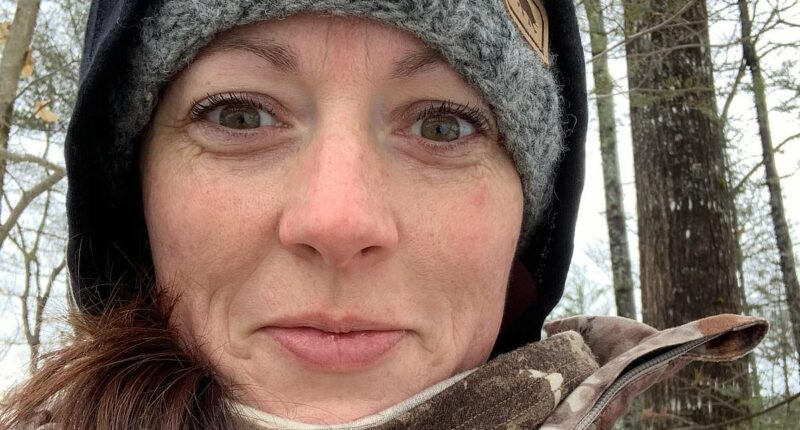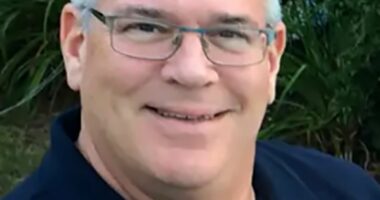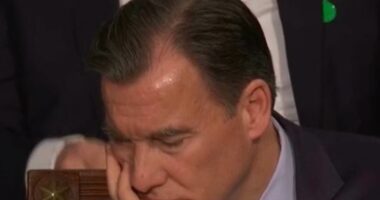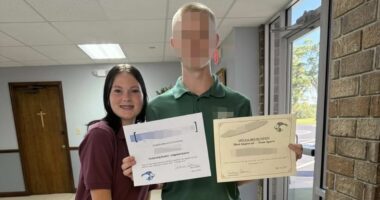Share this @internewscast.com
A female hunter from Maine has revealed the sexist question men often ask her.
Erin Merrill, a seasoned hunter, angler, and contributor to the Bangor Daily News, has discussed her aggravating encounters with men who often inquire, “Did you catch that yourself?”
In a recent article titled “Gender discrimination in Maine’s outdoors: One woman hunter responds,” Merrill shared her personal stories of male hunters doubting her capabilities.
“Women are among the fastest-growing groups in hunting and shooting sports, but many still face the skepticism I often encounter,” wrote Merrill, who also maintains a hunting blog.
Merrill said she’s noticed that having impressive ‘numbers’ – like the size of a catch – tends to help, but it doesn’t always do the trick.
She revealed that she shot and harvested a 457lb black bear and a 986lb dressed moose, but she ‘shouldn’t have to prove it every time.’
‘I assumed I was on equal footing with my fellow writers and outdoorsmen,’ she said. ‘I was so, so wrong.’
This isn’t Merrill’s first time addressing the issue. Over ten years ago, she published an article on the harassment women endure in the hunting community.

Erin Merrill shared her frustrating experiences with men in the outdoors

Merrill revealed that she shot and harvested a 457lb black bear and a 986lb dressed moose, but she ‘shouldn’t have to prove it every time’
Despite her best efforts to bring attention to the issue, she said her article was never published because ‘an editor refused to print it.’
That didn’t stop her from posting the piece to her blog, ‘And a Strong Cup of Coffee,’ where she detailed witnessing female hunters ‘being bullied.’
Merrill quickly started to realize the trend, which made her ‘sick.’
“Upon inquiring with my fellow female hunters about their experiences, the stories they shared made me sick to my stomach,” she wrote back in 2014.
In her most recent column, Merrill mentioned other women who have spoken up about the issue.
They include Shevenell Webb, a furbearer and small game specialist in Maine who ‘led the effort’ to write the 2020-2030 furbearer management plan.
A furbearer is described as an animal whose fur is valued commercially.
Merrill has conducted multiple interviews with Webb, describing her as “extremely knowledgeable” and someone who could compete with a veteran trapper.
Merrill also name-checked Jen Vashon, the lead bear and lynx biologist for the Maine Department of Inland Fisheries & Wildlife (DIF&W), and other leading women in the outdoors world.

Merrill has long been an advocate for women in the outdoors world

More than a decade ago, Merrill wrote an article on the harassment women face in the hunting world

As for what Merrill thinks about the future for women in Maine’s hunting and outdoor space, she wrote that it all ‘depends on welcoming everyone who shares our passion for the outdoors and conservation’
Catherine Gordon, the only female on the DIF&W Advisory Council, is a guide in Maine who works directly with veterans to get more women and girls involved in the outdoors, Merrill noted.
Christi Elliot spearheads a group of 7,500 women ‘who celebrate each other while improving and learning new outdoor skills,’ she wrote
Merrill also threw her support behind DIF&W Commissioner Judy Camuso, after a former worker accused her and the department of alleged discrimination against men in the industry ‘and favoritism toward women in promotions.’
Merrill decided to ‘proudly testify in support of Camuso’ so she can become the first female to run the department.
‘She has helped so many minorities and women get outside into the hunting and fishing world and feel comfortable doing so,’ Merrill wrote.
She noted that the very same editor who rejected her story years back recently condemned Camuso for reportedly creating a ‘matriarchy’ in the outdoor world.
‘The comment is absurd and telling,’ Merrill said.
As for what she thinks about the future for women in Maine’s hunting and outdoor space, Merrill wrote that it all ‘depends on welcoming everyone who shares our passion for the outdoors and conservation.’
And for the discrimination: ‘It’s time we end it – and let skill, passion and knowledge speak for themselves,’ she said.

















